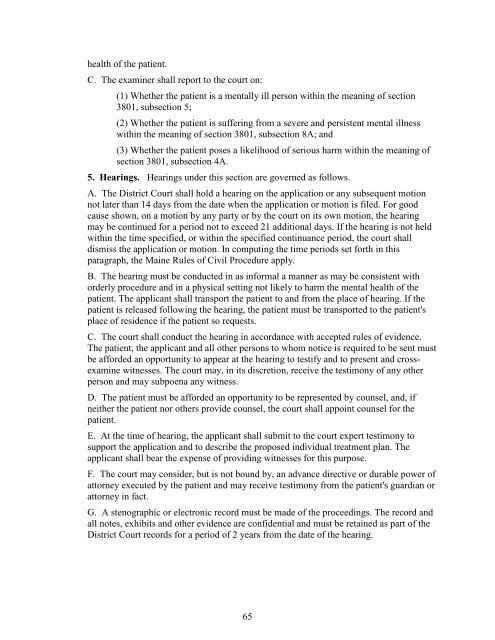involuntary hospitalization and outpatient services laws - Disability ...
involuntary hospitalization and outpatient services laws - Disability ...
involuntary hospitalization and outpatient services laws - Disability ...
Create successful ePaper yourself
Turn your PDF publications into a flip-book with our unique Google optimized e-Paper software.
health of the patient.<br />
C. The examiner shall report to the court on:<br />
(1) Whether the patient is a mentally ill person within the meaning of section<br />
3801, subsection 5;<br />
(2) Whether the patient is suffering from a severe <strong>and</strong> persistent mental illness<br />
within the meaning of section 3801, subsection 8A; <strong>and</strong><br />
(3) Whether the patient poses a likelihood of serious harm within the meaning of<br />
section 3801, subsection 4A.<br />
5. Hearings. Hearings under this section are governed as follows.<br />
A. The District Court shall hold a hearing on the application or any subsequent motion<br />
not later than 14 days from the date when the application or motion is filed. For good<br />
cause shown, on a motion by any party or by the court on its own motion, the hearing<br />
may be continued for a period not to exceed 21 additional days. If the hearing is not held<br />
within the time specified, or within the specified continuance period, the court shall<br />
dismiss the application or motion. In computing the time periods set forth in this<br />
paragraph, the Maine Rules of Civil Procedure apply.<br />
B. The hearing must be conducted in as informal a manner as may be consistent with<br />
orderly procedure <strong>and</strong> in a physical setting not likely to harm the mental health of the<br />
patient. The applicant shall transport the patient to <strong>and</strong> from the place of hearing. If the<br />
patient is released following the hearing, the patient must be transported to the patient's<br />
place of residence if the patient so requests.<br />
C. The court shall conduct the hearing in accordance with accepted rules of evidence.<br />
The patient, the applicant <strong>and</strong> all other persons to whom notice is required to be sent must<br />
be afforded an opportunity to appear at the hearing to testify <strong>and</strong> to present <strong>and</strong> crossexamine<br />
witnesses. The court may, in its discretion, receive the testimony of any other<br />
person <strong>and</strong> may subpoena any witness.<br />
D. The patient must be afforded an opportunity to be represented by counsel, <strong>and</strong>, if<br />
neither the patient nor others provide counsel, the court shall appoint counsel for the<br />
patient.<br />
E. At the time of hearing, the applicant shall submit to the court expert testimony to<br />
support the application <strong>and</strong> to describe the proposed individual treatment plan. The<br />
applicant shall bear the expense of providing witnesses for this purpose.<br />
F. The court may consider, but is not bound by, an advance directive or durable power of<br />
attorney executed by the patient <strong>and</strong> may receive testimony from the patient's guardian or<br />
attorney in fact.<br />
G. A stenographic or electronic record must be made of the proceedings. The record <strong>and</strong><br />
all notes, exhibits <strong>and</strong> other evidence are confidential <strong>and</strong> must be retained as part of the<br />
District Court records for a period of 2 years from the date of the hearing.<br />
65


